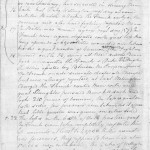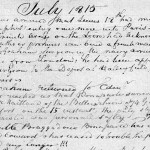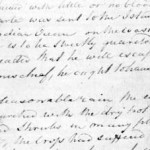The 18-21 June 2015 marks the Bicentenary of the Battle of Waterloo.
In March 1815, Napoleon Bonaparte had escaped from the island of Elba where he had been exiled since his defeat in the Peninsular War. He then returned to France and formed a government. In response, Great Britain and its allies (Prussia, Austria and Russia) prepared to invade France in early July 2015. Napoleon, being aware of the imminent attack, left Paris on 12 June to join his army.
The Diaries of Dr Thomas Lucas, a physician in Stirling, are held at Stirling Council Archives. The June 1815 diary entries transcribed below provide a civilian perspective on the threat of Napoleon and the Battle. We can also see that life at home and the weather still deserves attention.
June 1815
15 Bonaparte left Paris and went to the Netherlands, joined his army and attacked the Prussians at or near Charleroy, and succeded in driving them back but Duke Wellington next day advanced with the British, attacked the French early on the morning and after hard fighting repulsed them.
17 The Battle was renewed again next day (17), the French were again defeated with great loss there being upwards of 60,000 killed wounded and taken besides a great number of Cannon.
18 The Fight was renewed on the 18, during all these actions Bonaparte commanded the French and Duke Wellington the Allies assisted by Blucher the Prussian General. The French made severall desperate Charges but were always repulsed, at last Wellington charged the French, routed them with very great Slaughter pursued them till dark and took 210 pieces of Cannon, the loss is great on both sides, few prisoners were taken, as it appears that little quarter was given on either Side.
22 The losses in the battle of the 18 has been great. The French seem to be completely defeated, their loss amounts at least to 40,000 Killed wounded and prisoners. They appear to have had above 130,000 men in the battle, the Duke of Wellington including Allies had not above 90,000 to oppose them, the Allies have lost 10,000 in Killed and wounded.
Wrote Mr George Mackie of Liverpool relative to Walter.
The weather Fine and warm.
A party of the 91 Reg passed through from Perth to Glasgow, and
It is interesting to consider how and when Dr Lucas learned the news of Napoleon’s defeat. There were no local newspapers in Stirling at this time so Dr Lucas most likely learned the news in one of the national newspapers. The first three entries above appear to be dated when the event happened and not when Dr Lucas learned the news. Looking at the actual diary it appears he didn’t receive this news until 22 June, which is when the London newspapers reported the official dispatch from the Duke of Wellington. This was more than three days after the victory. Of course, the newspapers did report unofficial accounts in the preceding days. They would also have printed reports from foreign newspapers in the form of summaries sold by the Post Office. The edition of the Glasgow Herald published on 23 June did not yet contain the official news of victory (later reported on 26 June), but perhaps Dr Lucas managed to obtain a copy of, for example, The Times on 22 June.
Some further entries from July and August 1815:
July 1815
24 News reached us that Bonaparte surrendered to Captain Maitland of the Bellerephron of 74 Guns off Rochfort on the 15 instant. The only stipulation he requested was personall saftey (sic). The Mighty Invincible Braggadour Bonaparte has at last turned Coward and has ceased to trouble the peace of the world any longer !!!
New Potatoes sold for one shilling the peck of 28 lib.
The Supply of water from the Springs which is brought to the town in pipes, has been very scanty this Summer.
The weather has been favorable the whole of this month, there is an excellent appearance of an abundant Crop.
The Stirling Militia have been embodied to the number of 400 or thereby.
The Markets continue to be moderate.
August 1815
12 Bonaparte was sent to the Island of St Helena in the Indian Ocean on the coast of Africa where he is to strictly guarded, but tis dreaded that he will escape and do more mischief, he ought to have been put to death.
A fine seasonable rain, the country was much parched with the dry hot weather, the Trees and Shrubs in many places were withered, the Crops had suffered much.
More of the transcribed entries from the Dr Lucas Diaries are available at: https://thedrlucasdiaries.wordpress.com/
SCA Reference: PD16-4
Other references: https://www.waterloo2015.org/en/history; http://blog.britishnewspaperarchive.co.uk/2015/05/18/waterloo-and-the-british-press/


